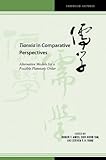Tianxia in Comparative Perspectives : Alternative Models for a Possible Planetary Order / ed. by Roger T. Ames, Sor-hoon Tan, Steven Y. H. Yang, Roger T. Ames, Peter D. Hershock.
Material type: TextSeries: Confucian CulturesPublisher: Honolulu : University of Hawaii Press, [2023]Copyright date: ©2023Description: 1 online resource (390 p.) : 1 b&w illustrationContent type:
TextSeries: Confucian CulturesPublisher: Honolulu : University of Hawaii Press, [2023]Copyright date: ©2023Description: 1 online resource (390 p.) : 1 b&w illustrationContent type: - 9780824896027
- online - DeGruyter
| Item type | Current library | Call number | URL | Status | Notes | Barcode | |
|---|---|---|---|---|---|---|---|
 eBook
eBook
|
Biblioteca "Angelicum" Pont. Univ. S.Tommaso d'Aquino Nuvola online | online - DeGruyter (Browse shelf(Opens below)) | Online access | Not for loan (Accesso limitato) | Accesso per gli utenti autorizzati / Access for authorized users | (dgr)9780824896027 |
Frontmatter -- Contents -- Acknowledgments -- Introduction -- Part I Challenging Hegemony and Global Capitalism -- 1 Relationality without Hierarchy: Hong Daeyong’s Reappraisal of Tianxia -- 2 Tianxia as Anticosmopolitan and Protoracial: A Case Study of Late Imperial Vietnam -- 3 “We Choose to Go to the Moon” for Truth, Justice, and Peace on Earth: A Dialogue for Socioeconomic Justice between Ubu-ntu and Buren -- 4 Ideology, Quixotism, or Enabling Utopia? The Notion of Tianxia as a Model for a New Form of Global Governance and Coexistence, Seen in the Light of the Japanese Experience -- 5 Toward a New World Order: Reading Tianxia with Marx and Hegel -- Part II From Nation-States to a Relational Ecology -- 6 Why Does Tianxia Need a Nation- State? Nation and Tianxia in Modern China -- 7 Comparing the Ancient Chinese Tianxia Order and the Postwar UN- Centric International Order -- 8 Tianxia and Islam -- 9 Tianxia: A Process of Relations -- 10 Universalizing Tianxia in an East Asian Context -- 11 Virtuosic Relationality and Ethical Diversity: A Buddhist Revisioning of International Relations beyond Anarchy and Hierarchy -- Part III A Minimalist Morality for Solidarity and Mutual Critique -- 12 Spheres of Global Justice and Tianxia Theory -- 13 Tianxia and Global Distributive Justice -- 14 Heavenly Governing All- under- Heaven: Reconceptualizing the Confucian Daren 大人 Idea for the Tianxia 天下 Leadership -- 15 Without War or Conquest: The Idea of a Global Political Order in Asoka’s Dhamma -- 16 From John Dewey to the Confucian “Idea” of Internationalism -- Contributors -- Index
restricted access online access with authorization star
http://purl.org/coar/access_right/c_16ec
Tianxia—conventionally translated as “all-under-Heaven”—in everyday Chinese parlance simply means “the world.” But tianxia is also a geopolitical term found in canonical writings that has a deeper historical and philosophical significance. Although there are many understandings of tianxia in this literature, interpretations within the Chinese process cosmology generally begin with an ecological understanding of intra-national relations that acknowledge the mutuality and interdependence of all economic and political activity.This volume contextualizes the tianxia vision of geopolitical order within a variety of strategies drawn from a broad spectrum of cultures and peoples. The conversation among the contributors is guided by several central questions: Is tianxia the only model of cosmopolitanism? Are there ideas and ideals comparable to tianxia that exist in other cultures? What alternative perspectives of global justice have inspired Western, Indian, Islamic, Buddhist, and African cultural traditions? The fundamental premise here is that in order for a planetary tianxia system to be relevant and significant for the present time and for our vision of the future, it must acknowledge the plurality of moral ideals defining the world’s cultures while at the same time seek practical ways to formulate a minimalist morality that can provide the solidarity needed to bring the world’s people together.
Mode of access: Internet via World Wide Web.
In English.
Description based on online resource; title from PDF title page (publisher's Web site, viewed 06. Mrz 2024)


